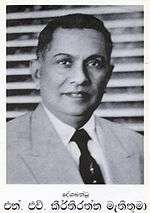N. H. Keerthiratne
| The Honourable N. H. Keerthiratne MP | |
|---|---|
 | |
| Personal details | |
| Born |
7 November 1902 Kegalle, Sri Lanka |
| Died |
15 November 1992 Rambukkana, Sri Lanka |
| Nationality |
|
| Political party | United National Party |
| Children |
Mihindu Keerthiratne Visaka Sujatha Asoka |
| Alma mater | St. Anthony's College, Kandy |
| Occupation | Politics, Agronomy |
| Religion | Buddhist |
Deshabandu N. H. Keerthiratne (7 November 1902 - 15 November 1992) was a distinguished Sri Lankan politician, philanthropist, and Cabinet Minister of Posts and Broadcasting. He was accepted as being a leader to the oppressed lower class at the time. Keerthiratne was also an agronomist par excellence.
Early life
N. H. Keerthiratne hails from a well-known family in Rambukkana – Kadugannawa area, where they became affluent by developing their own plantations at the beginning of the 20th century. His father, N. H. Abilinu was one of the largest land owners in Sri Lanka at the time. Keerthiratne was educated at St. Anthony's College, Kandy.
Political career

Keerthiratne contested Kegalle District during the first Parliamentary election of Sri Lanka in 1947, against Mr. R.V. Dedigama, and won by obtaining 14,560 votes. In 1953, he was appointed Minister of Posts and Telecommunications by then Prime Minister Sir John Kotelawala. Keerthiratne has the unique distinction of being the first person to send a “Telegram” in Sinhala.
In 1936, Keerthiratne contested for “Dedigama” electorate in the General Election against four main contestants, Dudley Senanayake, Richard Nugewela, P. B. Dedigama and Mudliyar J.W. Udalagama. Keerthiratne and his supporters were severely harassed and by some of the opponents there who were preventing him from running successful campaign. He responded to this by hiring a small aircraft and distributing election leaflets from the air, thereby making history— as this was the first time it was done in Sri Lanka.
Keerthiratne and his younger brother Asoka Karunaratne were known for their unique manner of breaking down barriers—by embracing a cooperative way of enriching relationships between individuals and groups. He represented the lower classes and minority castes, giving them a voice in the political arena for the first time.[1] In the words of N.H. Keerthiratne who gave an interview in March 1978, "These people were not given any responsible position in the country. Their job was planting. For that there is no objection. So we started planting, coconuts, any other things, vegetables, we began planting and making money.... Even those caste minded people wanted money, so they had to come to these people who were making money."[2]
In June 1939, Keerthiratne established the “Shasthrodaya Society” with the intention of uplifting the lives of underprivileged children in rural villages. Under this scheme, he was able to build more than 50 schools, which, in later years had an immense impact on development and well-being of the people in the communities.
Keerthiratne was a devout Buddhist and built more than 30 Buddhist temples throughout the island of Sri Lanka during his lifetime.
Honours
He was awarded the title of Deshamanya by the Sri Lankan Government.
See also
References
- ↑ Jiggins, J. (1979) Caste and Family Politics Sinhalese 1947-1976, Cambridge University Press.
- ↑ Meyer, Eric (1978) Interview of N.H. Keerthiratne. March 1978, Rambukkana. http://slkdiaspo.hypotheses.org/1354
Abeynaike, H.B.W (ed). (1965) Parliament of Ceylon, Lake House, Colombo: Associated Newspapers of Ceylon Ltd.
Somapala, R.A. (1992) Biography of N.H. Keerthiratne, 30 October 1992, Rambukkana.